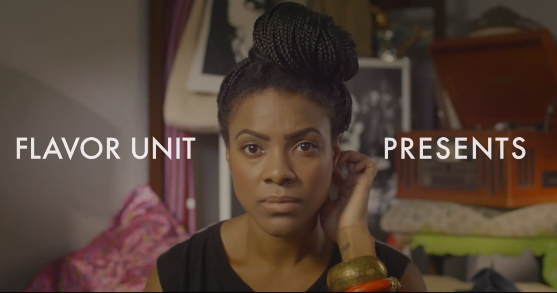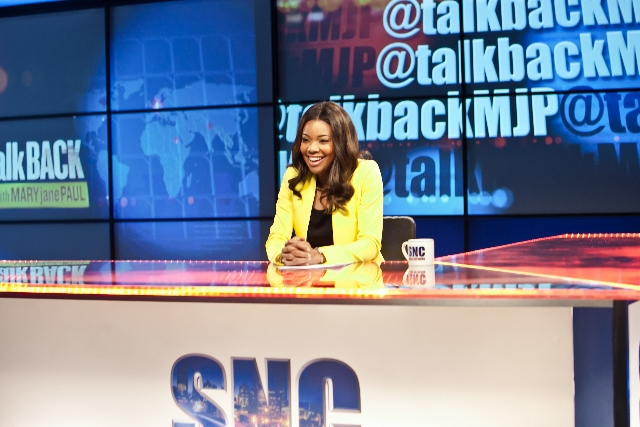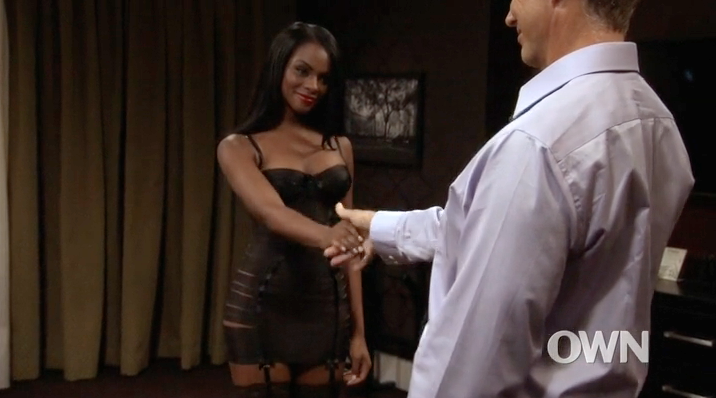The Black TV Crisis and the Next Generation
Aymar Jean Christian / Northwestern University

In 2011 New York’s Diana Scholl asked Issa Rae if she was planning to turn her hit web series, The Misadventures of Awkward Black Girl, into a full-length TV show. At the time her first season was coming to a close and Rae, in a pioneering move, had raised over $50,000 on Kickstarter to finish it, eventually finding a home for season two on Pharell William’s iamOTHER YouTube channel. “We’re successful showrunners, give us a chance to have creative control,” Rae told Scholl of indie TV creators’ pitch to traditional network executives.1
And then she said: “If Awkward Black Girl could make it to HBO starring a dark-skinned black girl, that would be revolutionary.”
It would indeed. Fast forward two years later when Deadline announced Rae and The Daily Show’s Larry Willmore were developing a show for HBO about “the awkward experiences and racy tribulations of a modern day African-American woman.” HBO buys a lot of pilots and green lights precious few, but the news was inspiring if for no other reason than Rae called it and, if successful, could break barriers for young writers, black female showrunners and indie TV creators alike.
In my last column I argued television’s best shows were ignoring diversity at the expense of storytelling, looking specifically at black representation on pricey primetime dramas.2 This deep wrinkle in TV’s second golden age provokes the question: if series creators like Matthew Weiner and networks like AMC are finding it difficult to tell stories about people of color in America, who will?
The answer could end a crisis in contemporary television. Despite an expanding number of channels, the stories we get from television are limited, particularly regarding race. At a time when poll after poll show gaps in how Americans of different races view racial crises (e.g. Trayvon Martin), diversifying our nation’s storytellers – and giving them creative license – is more pressing than ever.
Saavy TV watchers mention Issa Rae as a promising antidote to the glut of anti-hero dramas and high-budget franchises on cable. There are others as well. The same day her deal was announced, FX revealed it was developing a comedy from Donald Glover (Community, 30 Rock) for an exciting show, Atlanta, which sounds a lot like a millennial Fresh Prince. Up-and-coming writer Lena Waithe is shopping a very interesting pilot, Twenties, with Queen Latifah’s Flavor Unit attached.3 Waithe uploaded it to YouTube to pressure network executives to take a risk on a show about a black woman who is not straight.
That two development deals can feel so refreshing reflects the sorry state of black creative production in Hollywood. Black television today is a collection of reality shows on VH1 and Bravo; mediocre family sitcoms on TV Land and TBS; and a sprinkling of good-to-great ensemble dramas on ABC (Scandal, great), HBO (Treme, great) and Fuse (The Hustle, good). Development deals come and go, and I am admittedly skeptical the crisis will stop with FX and HBO, the network where both Dee Rees and Spike Lee’s TV projects went to die (Lee and Mike Tyson did end up collaborating, but on a special, not series). FX has been, until W. Kamau Bell’s Totally Biased, home to comedies and dramas exclusively about white guys, albeit terrific ones.
Of the dozens of networks developing original programming, only two (BET and OWN) are releasing programs in all three genres. Both mostly focus on cheaper reality and talk shows, and both are either incapable or unwilling to do what it takes to break the fever ailing Hollywood’s black creative class: investing in a broad, diverse cross-section of emerging talent like Rae and Glover.
BET and OWN instead are putting their development eggs in two separate, shallow baskets: Salim and Mara Brock Akil (BET) and Tyler Perry (OWN).
Programming from a single source? This is a mistake.
The Akils are best known as the creative team behind Girlfriends and The Game, the show that set records and gave BET the push it needed to dive into original programming. BET has since rewarded the pair with a number of shows, scripted and reality, including its first hour-long drama, Being Mary Jane, a perfectly fine vehicle for Gabrielle Union coming to series early 2014. Their work is pulpy and satisfying, though hardly inspiring or innovative.

Tyler Perry, on the other hand, represents a race to the bottom for black television. Perry’s chief innovation in the market has been the infamous 10/90 deal, where networks pilot a program for ten episodes and license 90 more if it succeeds. To produce a 10-episode pilot the programs have to be cheap sitcoms with a built-in audience, and so Ice Cube’s Are We There Yet? (a spin-off of his film with the same name) and Charlie Sheen’s Anger Management (released after his calamitous exit from Two and a Half Men) have followed Perry’s lead. Perry kept costs low4 by hiring writers to write 100 episodes of House of Payne and then firing them when they sought a union contract to get residuals. Perry eventually relented, but most of the writers stayed fired.5
For his shows at OWN, Perry decided he didn’t need to pay WGA writers and wrote all episodes of the primetime soap, The Haves and the Have Nots, and the sitcom, Love Thy Neighbor, himself. The result is undoubtedly the worst drama and worst sitcom of the year, a rare feat for the former queen of media, Oprah Winfrey. Brittney Cooper, in her trenchant analysis of the soap, wrote: “Tyler Perry is dangerous. He has made Black women mistake hate for love.”6
Perry has proven adept not at storytelling; but rather moving his audience across media – theater, film, television – by inking lucrative deals with networks and distributors like TBS, OWN and Lionsgate (aided by Debmar-Mercury, the 10/90 pioneer). The result is a microcosm of what’s happening in black TV generally: a focus on luring content-starved audiences at the expense of nurturing a dynamic community of storytellers for the next generation.

As Cooper argues: “Really, OWN is struggling. And when networks struggle, they pimp the ‘urban demographic’ for ratings and money. And once they are set financially, they bounce. The Fox Network did it: Living Single, Martin, In Living Color. The WB, UPN, and the CW all did it. So I see what O is doing, and I resent it.”7
Cooper could have added HBO (Oz, The Wire), Showtime (Soul Food, Sleeper Cell), Logo (Noah’s Arc), VH1 (Single Ladies), Fuse (The Hustle) and even Lifetime (Any Day Now, Sherri) to that list. At a time when cultural products are easily lost in an aggressive, conglomerate-controlled marketplace, black storytellers have had a hard time finding career stability. They produce audiences to generate buzz for new networks, which soon move to broaden budgets and development slates for “higher quality” programs.
What television needs is a development structure that allows fresh, young, diverse talent to grow and shepherd projects from other writers to more networks. This is partially what happened in the 1990s, when broadcast networks like Fox and NBC cultivated an entire generation of writers and stars. In a post-network environment, these storytellers need to be freed of the mandate to produce large audiences overnight – a license given to talents like Lena Dunham and Louis CK, neither of whom have broken 1 million viewers in overnight ratings.
I have no doubt Glover and Rae have the talent to do it. But will FX and HBO let them? And, barring that, are network executives equipped to empower more like them? How about more that are not like them- who are queer or trans, less conventional or more, less privileged or more, or working in genres outside comedy? Black television never only benefited black producers, nor just black audiences. Hollywood – from the film studios that boosted TV stars to the networks who’ve built cable brands on black content – has been greatly enriched by investing dutifully in new crops of storytellers. The current marketplace is broken. In my final column, I will offer insights into how media companies can correct their track records on diversity and, maybe, slow dips in ratings and bombs at the box office along the way.
Image Credits:
1. Lena Waithe’s Twenties is currently being shopped around Hollywood. (Author screen capture, Twenties, Flapr Unit.)
2. BET’s Being Mary Jane will debut January 2014. (Author screen capture, Being Mary Jane, BET.)
3. OWN’s The Haves and Have Nots was produced and written by Tyler Perry. (Author screen capture, The Haves and Have Nots, OWN.)
Please feel free to comment.
- Diana Scholl, “Issa Rae on The Mis-Adventures of Awkward Black Girl,” Vulture, December 14, 2011, http://www.vulture.com/2011/12/issa-rae-on-the-mis-adventures-of-awkward-black-girl-and-creating-the-black-liz-lemon.html [↩]
- Black production and representation remains the most efficient way to examine TV’s diversity shortcomings, as other [↩]
- Waithe shot parts of the pilot and uploaded it to YouTube as a demo: “A lot of networks read the script and loved it, but they either thought there wasn’t an audience for it or that it already existed. Of course I became extremely frustrated because I knew neither of those things were true.” Masha Dowell, “Interview: Writer/Producer Lena Waithe Talks New Series ‘Twenties’ + Watch Pilot Presentation,” Shadow and Act, August 13, 2013, http://blogs.indiewire.com/shadowandact/interview-writer-producer-lena-waithe-talks-new-series-twenties-watch-pilot-presentation [↩]
- At $500,000 an episode, roughly one-third broadcast averages. Meanwhile, the deal was reportedly estimated at $200 million for House of Payne, of which Perry took 60%. John Dempsey, Syndies rewrite sitcom script. August 28—September 3. Variety, 2006, pg 24. [↩]
- Nikki Finke, “TOLDJA! Tyler Perry Studios And WGA Reach Agreement Mediated By NAACP,” Deadline, November 26, 2008, http://www.deadline.com/2008/11/toldja-tyler-perry-studios-and-wga-settle-naacp-mediated [↩]
- Brittney Cooper, “Tyler Perry Hates Black Women: 5 Thoughts on The Haves and The Have Nots,” Crunk Feminist Collective, May 29, 2013, http://www.crunkfeministcollective.com/2013/05/29/tyler-perry-hates-black-women-5-thoughts-on-the-haves-and-have-nots [↩]
- Cooper, Crunk Feminist Collective. [↩]
Pingback: Televisual | The Black TV Crisis And The Next Generation
As the article points out, with the vast number of television stations available at the click of a remote, the still ongoing struggle of television shows centered primarily around an African-American cast still remains an issue within the airwaves. However, I personally feel that if viewers step back and take a look at prominent characters on some of the biggest shows currently on the air there is encouraging signs that the situation at the very least is improving. In terms of television shows as a whole, there is no argument that programs with a primarily black cast are few and far between, but is that really what people are asking there needs to be more of? For example from the mid-eighties into the mid-nineties, television shows such as “The Cosby Show,” “A Different World,” “Family Matters,” and “The Fresh Prince of Bel-Air,” took the barrier that predecessors such as “Good Times” and “The Jefferson’s” started, and initially, seemed to raise it. Here were shows dealing with the family dynamic that was usually reserved for a Caucasian cast, but were starring a cast that was mainly African-American. Now as these shows were extremely popular during their runs, as time as passed, usually they are looked back upon as “corny” or “cheesy” in the eyes of the viewing public. This mindset probably does not stem from the idea that the shows are that way because of the skin color of the cast, but rather because sitcoms from that era, as a whole (let’s include “Full House,” “Boy Meets World,” “Saved by the Bell,” “The Brady Bunch,” “Growing Pains” etc.), all possess that stigmata as well.
The modern era of television is primarily focused on individuals, the stories of families or groups as a whole have dissipated as audiences now want growth and character development. The shows that dominate the public conversation are all character driven. It is also within some of these shows that an African-American presence are starting to become more visible. HBO’s “Boardwalk Empire” has been a hugely successful series for the network, a prominent character on the show is Albert “Chalky” White a powerful gangster in 1920s Atlantic City. That description right there has already shattered what a normal “perception” of what television has generally portrayed an African-American to be in this era. Usually it would be a character facing oppression from whites or having “secretary” or “bell-hop” type jobs (e.g. Don Draper’s latest secretary in the 1960s set “Mad Men”), but here “Chalky,” played by Michael K. Williams (formerly in HBOs “The Wire” a very popular series with a strong black presence) is a black man who has a position of power amongst a world of whites. While “Boardwalk…” can only appeal to a certain audience due to its premium cable status, broadcast television has begun to catch on to the trend as well. In the past two seasons of “Glee” the audience has been introduced to Wade “Unique” Adams, a trans-woman (a male sexed individual who possess a female gender identity). “Unique” dresses, talks, acts and sings in the style of a female, but is a man. While “Glee” is known for its commitment to characters of different races, handicaps, etc. it is interesting they selected black actor for this role. While the topic of trans-gender is not new, in media, it is RARE that a trans-gender is portrayed by an African-American. Even as sitcoms have become more focused on individuals, Tracy Morgan in “30 Rock,” Idris Elba possessing a story-arc within “The Office,” fit the mold of African-Americans starting to land and excel in prominent roles within shows containing strong character growth.
To me, the issue at hand should not be focused on shows with a primarily black cast, it should be the development of stronger minority characters within shows themselves. That is where the issue lies. The group dynamic of show’s just rarely works in this day “Meet the Browns,” “House of Payne,” “Greetings from Tucson,” “The George Lopez Show,” all just could not survive, and more often than not would just reinforce stereotypes. The crisis is character development, and while there are many good examples of the trend changing, there is still an alarming lack.
Pingback: Televisual | Open TV: Rescue Pilots from Development Hell
Pingback: FROM WEB SERIES TO TV SERIES: BET INKS A DEAL TWENTIES CREATOR | GO SIP TV